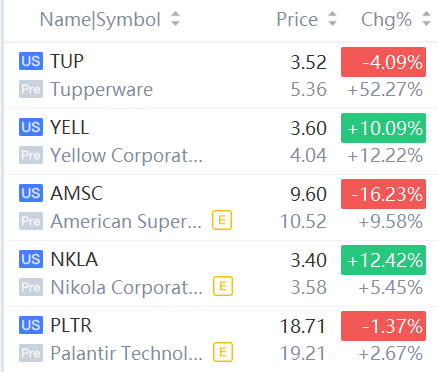Meme stocks jump in premarket trading, with Tupperware stock surging 52%.
Yellow Corp. soars 12.22%; American superconductor rises 9.58%; Nikola rises 5.45%; Palantir rises 2.67%.
Tupperware Brands said on Thursday it has finalized an agreement with its lenders to restructure its debt obligations in an effort to turnaround its business.
The agreement will help the company to reduce or reallocate about $150 million of cash interest and fees, and would give it immediate access to a revolving borrowing capacity of about $21 million.
Known for its plastic airtight storage containers and bowls, Tupperware has seen a sharp drop in demand recently as consumers limit discretionary purchases amid higher prices and fears of recession.
The company had on April 7 raised doubt about its ability to continue as going concern after failing to improve its business for about three years. The company reported $705.4 million in total debt for 2022.
In May, it signed investment bank Moelis & Co to help explore strategic options and said it has found additional prior period misstatements in its financial reporting.
The agreement also paves the way for the extension of the maturity of about $348 million of principal and reallocated interest and fees to 2027 with payment-in-kind interest.
It is also expected to aid a reduction of amortization payments required to be paid through 2025 by about $55 million.
Despite the going concerns, the company's shares have jumped as much as 869% from its July 19 low, mirroring the moves seen in financially challenged companies like Bed Bath & Beyond and other "meme" stocks known for their popularity with retail investors.
Shares of Yellow have surged as much as 1,062% from its July 27 low.
Both rallies have occurred on little fundamental news, and instead appear to have been partly driven by a short-squeeze, in which short-sellers close out their bearish positions by buying back the stock, putting more upward pressure on the stock price.
Yellow's short interest has surged from about 8% at the start of the year to more than 12% in mid-July, while Tupperware has seen its short interest more than double from about 9% at the start of the year to about 22% in mid-July.
These rallies could be putting other short-sellers on notice and causing them to reduce their positions in order to avoid getting caught in a painful short-squeeze. Heavily shorted Rite-Aid, which had short interest above 20% in mid-July, saw its stock price soar as much as 68% on Wednesday despite a lack of fundamental news.

